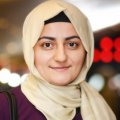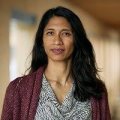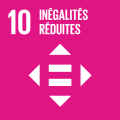Digital Inclusion and Generative Artificial Intelligence: Is Gipuzkoa socially cohesive and digitally sustainable?
Action-research to address the strategic challenges of the data gap and digital rights with vulnerable communities.
Description
The historical territory of Gipuzkoa is shaped by its unique socioeconomic and cultural characteristics. Over decades, it has developed into a socially cohesive society. The province’s population and institutions particularly value community-driven initiatives, cultural diversity, and social transformation through collaboration.
In this local context, 21st-century Gipuzkoa should aspire to become a digitalized society where social cohesion remains a fundamental pillar, in line with international trends. However, it is crucial to acknowledge the significant social impact of the current surge in Generative Artificial Intelligence (GenAI) on Gipuzkoa’s citizens and communities. In daily life, algorithmic decision-making directly affects people’s activities in healthcare, banking, shopping, social interactions, and employment, among others. Beyond concerns about privacy, issues such as biometrics, data extraction, and the growing presence of disinformation on social media platforms highlight how digital technology is increasingly distancing itself from citizens’ understanding. Moreover, as international research has demonstrated (Eubanks, 2017), the effects of Generative AI and data exploitation are particularly pronounced for vulnerable communities.
Among the disruptive challenges that can be identified are: the impact of the data gap, the need to guarantee digital rights, and the necessity of developing specific strategies and public policies to foster digital inclusion.
By recognizing digital rights as fundamental human rights, the Directorate for Human Rights and Democratic Culture of the Provincial Council of Gipuzkoa organizes this Summer Course with the active participation of communities and citizens. The initiative is organised and funded by the Province Council of Gipuzkoa and led by Prof Igor Calzada, in direct collaboration with local and international partners. The strategic challenge of fostering a socially cohesive and digitally sustainable society falls within the responsibilities of the Gipuzkoa Provincial Council, which promotes social innovation practices.
The main objective of this Summer Course is to answer the following action-research question: If Gipuzkoa is a socially cohesive territory, is it also digitally sustainable?
Objectives
Social cohesion: To analyze and promote the inclusion of vulnerable communities and ensure equal participation opportunities. The objective is to examine the impact of Generative AI and other emerging technologies on vulnerable communities through action-research, fostering effective practical exercises with migrant communities and Gipuzkoa’s citizens in general.
Digital rights, inclusion and sustainability: To ensure the protection of digital rights for all communities in Gipuzkoa, with a special focus on vulnerable social groups, such as migrants. By promoting responsible and ethical use of technology, AI and data, the goal is to create a safe and just digital environment for both vulnerable communities (migrants) and Gipuzkoa’s citizens.
AI and social innovation (AI for Social Innovation; AI4SI): This Summer Course is not only designed to prepare pedagogical content on data and algorithms, but it also aims to propel Gipuzkoa’s society toward a shared strategic goal, ensuring that no one is left behind. Beyond social cohesion, the objective is to establish a community-driven digital model that is socially cohesive and digitally sustainable, embracing plurality and diversity while considering the risks and opportunities of digital society.
Generative AI (GenAI) and urban and territorial AI: Given the rapid penetration of AI in Gipuzkoa, the Summer Course also seeks to analyze the implications of Generative, Urban, and Territorial AI (https://www.emeraldgrouppublishing.com/calls-for-papers/generative-ai-and-urban-ai-policy-challenges-ahead-trustworthy-ai-whom). Since AI's effects in Gipuzkoa can be diverse, the aim is to conduct action-research in collaboration with institutional representatives from Barcelona, Rotterdam, Bordeaux and Wales to directly understand initiatives in leading cities and regions facing the algorithmic tsunami.
Activity directed to
- All public
- University student
- Teachers
- Professionals
Methodology
The Summer Course follows an iterative action-research methodology, structured into three key blocks:
First block: International radar and co-production. In this first phase, after introducing the Digital Inclusion & Gen AI framework, international trends and experiences will be analyzed, identifying elements applicable to the digital context of Gipuzkoa. Several case studies will be examined in collaboration with the Cities Coalition for Digital Rights, particularly with cities such as Barcelona, Rotterdam and Bordeaux. Additionally, insights from the CWMPAS cooperative in Wales will be explored, focusing on digital inclusion for migrants and the design of public policies.
Second block: Workshop with migrants and discussion panel. In this second phase, the focus will shift to Gipuzkoa, promoting the direct participation of vulnerable communities, particularly migrant groups. Practical workshops with migrant communities and discussion panels with diverse experts (journalists, activists, lawyers, and business representatives) will be organized to identify challenges and opportunities in digital inclusion. Active participation will be at the core of the methodology, providing students and community members with opportunities to share their experiences.
Third block: "Lightning talks" with stakeholders. The final phase will facilitate direct conversations with institutions in Gipuzkoa and the Basque Country through a "lightning talks" format. Public policy officials, academic experts, and community representatives will convene to discuss digital inclusion strategies. The primary objective of this block is to share the findings from previous phases and define a roadmap for the future.
The Summer Course adopts an iterative and participatory action research methodology, aiming to develop inclusive digital strategies for the Gipuzkoa’s community and promote policies aligned with social realities.
Contributors
Directors
Prof. Dr. Igor Calzada, MBA, FeRSA is Full Professor in Interdisciplinary Social Sciences and Humanities (Unibasque) and an Ikerbasque Principal Investigator at the University of the Basque Country (EHU), based in the Public Policy & Economic History Department. An Established Researcher (R3) with 20+ years of international experience, he is affiliated with Cardiff University/WISERD (UK), and Fulbright Scholar in California (USA), collaborating as Fellow with the Decentralization Research Centre (Canada). He is also Invited Professor at SGH (Poland), IIT Delhi (India), and BME (Hungary). His research explores digital inclusion, territorial development, and Web3 technologies—Blockchain, DAOs, and Data Cooperatives—to reshape data governance and AI. From 2012–2022, he held senior roles at the University of Oxford, European Commission JRC, and UN-Habitat. Previously, he worked in the Basque Government and Mondragon Cooperatives. With posts in 14 universities, 5,200+ citations (h-index 33/i10-index 72), he was named among Apolitical’s 100 Most Influential Academics in Government. More at: www.igorcalzada.com/publications.

Itziar Eizagirre Irureta
GIPUZKOAKO FORU ALDUNDIA
Dr. Itziar Eizaguirre, Ph.D., Province Council of Gipuzkoa, Spain. She holds a PhD in Governance for Sustainable Development (2024) from the University of the Basque Country. With expertise in environmental law, ecopolitics, and territorial sustainability, she has served for 20 years as a consultant and manager for public administrations on governance, strategic planning, and climate policy. Currently, she works at the Human Rights and Democratic Culture Directorate of the Gipuzkoa Provincial Council. She co-directs the UIK 2025 Summer School Digital Inclusion & GenAI (15–16 July 2025, San Sebastián, Spain).
Speakers

Joan Batlle Montserrat
Joan Batlle Montserrat led the Cities Coalition for Digital Rights from its creation in 2018 until early 2025. A specialist in urban digital policy, he has promoted digital rights, data ethics, and technological sovereignty. He is currently involved in CIDOB’s Urban AI project, addressing the social and democratic implications of AI in cities.
Prof. Dr. Igor Calzada, MBA, FeRSA is Full Professor in Interdisciplinary Social Sciences and Humanities (Unibasque) and an Ikerbasque Principal Investigator at the University of the Basque Country (EHU), based in the Public Policy & Economic History Department. An Established Researcher (R3) with 20+ years of international experience, he is affiliated with Cardiff University/WISERD (UK), and Fulbright Scholar in California (USA), collaborating as Fellow with the Decentralization Research Centre (Canada). He is also Invited Professor at SGH (Poland), IIT Delhi (India), and BME (Hungary). His research explores digital inclusion, territorial development, and Web3 technologies—Blockchain, DAOs, and Data Cooperatives—to reshape data governance and AI. From 2012–2022, he held senior roles at the University of Oxford, European Commission JRC, and UN-Habitat. Previously, he worked in the Basque Government and Mondragon Cooperatives. With posts in 14 universities, 5,200+ citations (h-index 33/i10-index 72), he was named among Apolitical’s 100 Most Influential Academics in Government. More at: www.igorcalzada.com/publications.

Jorge Campanillas
Jorge Campanillas is a lawyer from Donostia-San Sebastián, specialized in technology law, data protection, intellectual property, and digital governance. He founded the law firm Iurismática Abogados and advises public and private institutions on the ethical and legal use of digital technologies. He is a frequent speaker in national legal and tech forums.

Itziar Eizagirre Irureta
GIPUZKOAKO FORU ALDUNDIA
Dr. Itziar Eizaguirre, Ph.D., Province Council of Gipuzkoa, Spain. She holds a PhD in Governance for Sustainable Development (2024) from the University of the Basque Country. With expertise in environmental law, ecopolitics, and territorial sustainability, she has served for 20 years as a consultant and manager for public administrations on governance, strategic planning, and climate policy. Currently, she works at the Human Rights and Democratic Culture Directorate of the Gipuzkoa Provincial Council. She co-directs the UIK 2025 Summer School Digital Inclusion & GenAI (15–16 July 2025, San Sebastián, Spain).

Zeynep Engin
Zeynep Engin is a researcher and advisor in responsible AI and algorithmic governance. She founded Data for Policy to promote ethical and inclusive data use in public decision-making. She works with European and international bodies to align digital technologies with democratic values and digital rights.

Gemma Galdon Clavell
Gemma Galdon-Clavell doktorea Eticas Consulting-eko sortzaile eta zuzendari nagusia da, eta kudeaketaren, zuzendaritza estrategikoaren eta ikuspegia gauzatzearen arduraduna da. Teknologiaren eta datuen erabileraren eragin sozial, etiko eta legalean duen diziplina anitzeko prestakuntzari esker, taldearekin batera, irtenbide praktikoak diseinatu eta ezar ditzake datuak babesteko, etika, argigarritasuna eta adimen artifizialeko alborapenaren erronkak zehazteko. Haren ekarpenek bat egiten dute zehaztasun akademikoarekin, esperientzia politikoarekin eta prozesu teknologikoetan pertsonak babesteko konpromisoarekin, eskubideak eta balioak zehaztapen tekniko bihurtzen dituzten soluzio eta zerbitzu aitzindarien bidez.

Simona Levi Accati
Simona Levi is an activist, theatre director, and technopolitical strategist. She founded Xnet, a platform defending digital rights, transparency, and civic technologies. Since 2019, she has led the Democratic Digitalisation Plan for Education, promoting open-source tools in schools. She is the author of Digitalización democrática. Soberanía digital para las personas (2024), and directs a postgraduate programme on technopolitics and digital rights at the University of Barcelona and Pompeu Fabra University.

Seeta Peña Gangadharan
Seeta Peña Gangadharan is Associate Professor in the Department of Media and Communications at the London School of Economics. Her work explores digital justice, technological exclusion, and grassroots resistance to data-driven surveillance. She co-led the Our Data Bodies project and publishes widely in top journals. She advocates for inclusive digital policy and community-led tech governance.

Alex Rayón
Alex Rayón is a specialist in digital transformation, data analytics, and artificial intelligence. He served as Vice-Rector for International Relations and Digital Transformation at the University of Deusto, where he was also a professor and researcher in digital economy. He is currently CEO of Brain & Code, a consultancy focused on tech innovation and executive training. He frequently appears in media and conferences on AI and digital society.

Dr. Daniel Roberts
Dan Roberts works at Cwmpas (Wales), a leading organization in social innovation, digital inclusion, and cooperative economy. His work ensures that emerging technologies, including AI, are developed ethically and with community benefit. He leads programmes on digital skills, tech justice, and inclusive place-based development.

Miranda Saunders
Miranda Saunders leads digital inclusion projects at the City of Rotterdam, a member of the Cities Coalition for Digital Rights (CCDR), a network of 70+ cities worldwide. With a background in banking and social services, she has shaped inclusive innovation policies and serves as an external advisor at Inholland University of Applied Sciences. She received the Responsible AI Code of Conduct through her work with the Rotterdam Social AI Lab.
Summary
Conclusions sent by the direction of the Summer Course
Sustainable development goals
Agenda 2030 is the new international development agenda approved in September 2015 by the United Nations. This agenda aims to be an instrument to favour sustainable human development all over the planet, and its main pillars are the eradication of poverty, a reduction in equality and vulnerability and fostering sustainability. It is a unique opportunity to transform the world up to 2030 and guarantee human rights for all.

10 - Reduced inequalities
Reduce inequality in countries and between them. Key issues: promotion of the social, economic and political inclusion of all people, equal opportunities, fiscal, wage and social protection policies to favour equality, migration and the policies that affect it, official assistance for the development, regulation and supervision of world institutions and markets.
More information







